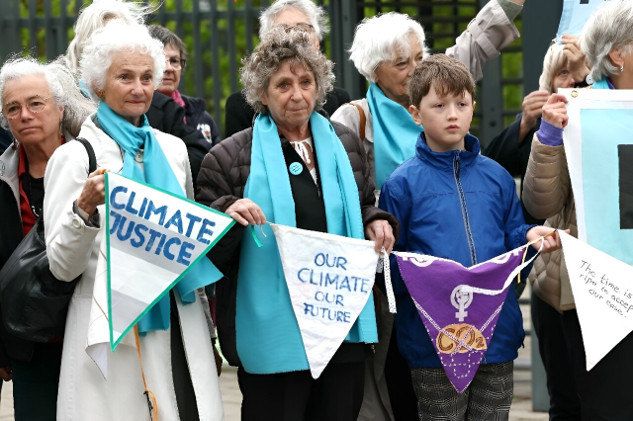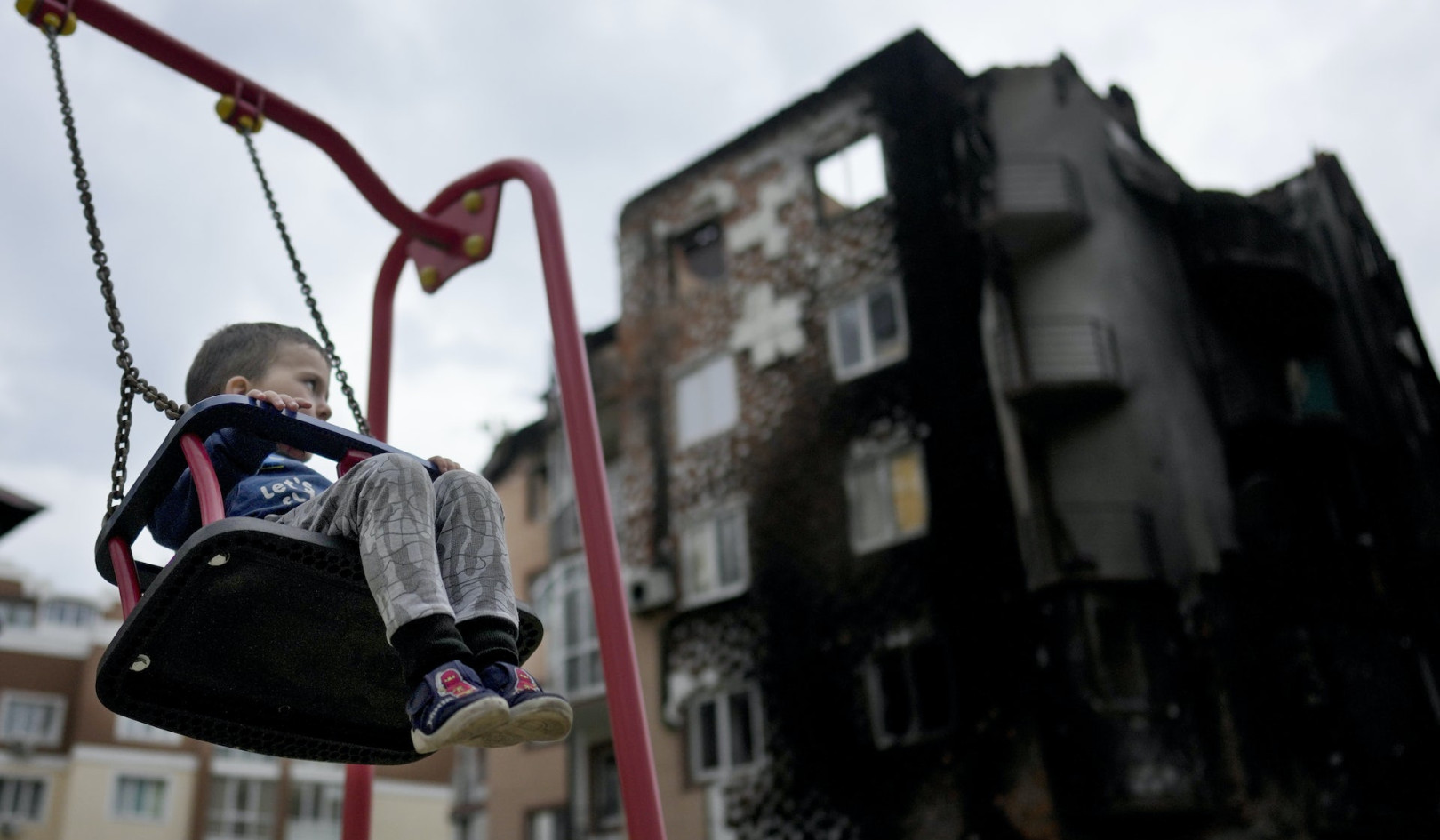
The European Court of Human Rights has issued a banebrydende dom in a case between a group of Swiss women and their government. It found that Switzerland is in violation of the European convention on human rights for failing in its duties to combat climate change. The court also set out a path for organisations to bring further cases.
I have been researching human rights
This case was the first opportunity for the court to consider the duties of states in the context of climate change, and the first climate change case to be heard by an international human rights court. The decision will have a ripple effect across Europe and beyond, as it sets a binding precedent for how courts should deal with the rising tide of litigation in which it is argued that the climate crisis involves human rights violations.
The court calls itself “the conscience of Europe” and its rulings apply in 46 member states, which includes all the EU, plus the UK and various other non-EU countries. Its ruling opens up all these states to similar cases in their own national courts – cases that these states are likely to lose.
The court held that the European convention requires states to seek to be kulstofneutral within three decades, and take adequate interim measures to achieve this. Switzerland was failing to do so.
Those who took the case are the KlimaSeniorinnen Schweiz, a group of 2,400 Swiss women over age 64, who argued that because older women are more likely to die in heatwaves Switzerland must take greater action to prevent the planet heating beyond the Paris agreement target of 1.5°C. Heatwaves, the KlimaSeniorinnen argued, have become hotter and more common because of fossil fuels.
The court ruled that Swiss authorities had not acted in time to come up with an adequate strategy to cut emissions. This, the court found, constitutes a violation of artikel 8, the right of these women to respect for their private and family life (encompassing health). It also found the applicants had not had appropriate access to justice in Switzerland, as the Swiss courts did not consider the merits of their case adequately.
The judgment makes it clear that the climate crisis is a human rights crisis, and that states have human rights obligations in this regard. States must act urgently and effectively, and operate in accordance with the best available science to prevent further violations of human rights in the climate crisis.
Intergenerational solidarity
The outcome might seem mixed because some claims were left undetermined. In the same sitting for example, the court deemed “inadmissible” a petition by seks portugisiske børn og unge who argued that, because of their age, they will see greater climate damage than previous generations and that disasters such as naturbrande violate their right to life. The court did not admit the case primarily because the young people had not gone through Portuguese courts first, as one has to do before taking a case to the European Court of Human Rights.
But, in fact, the outcome is a huge success. The fact that children and young people are accessing courts and working together with older people for climate justice, makes this an spændende tid. This is true intergenerational solidarity for the planet.
Those attending the hearing in the court in Strasbourg were as young as 12. Despite the dismissal of their application, they celebrated together with their older Swiss counterparts, after a member of a panel of 17 judges read out the verdicts. Climate activist Greta Thunberg joined the gathering outside the court. “Their [the Swiss] win is a win for us, too,” said Sofia Oliveira, a 19-year-old applicant in the Portuguese case. “And a win for everyone.”
Hvad sker der nu
This ruling will influence climate action and climate litigation across Europe, as well as influencing cases in other parts of the world too. All states which are parties to the European convention on human rights have the same obligations as Switzerland. Like Switzerland, they will need to aim for carbon neutrality and be able to demonstrate they are taking measures to achieve this, otherwise they may be violating human rights.
The ruling will directly affect other climate cases before the court. Norge, for instance, is being taken to court for issuing new oil and gas licences, while Østrig has been taken to the court by a man with a temperature-dependent form of multiple sclerosis.
Furthermore, the precedent will be followed by national courts. Cases against Belgien, Tyskland , Polen, for example, challenge inadequate measures to address climate change.
The judgment also has ramifications beyond Europe, and will probably affect forthcoming litigation in other jurisdictions and at an international level, for example, at the Internationale Domstol.
It is likely therefore that we will see a lot more countries held to account for failing to do their part to stop climate change, and this may form a crucial part of the impetus that we need to stop the climate crisis.![]()
Aoife Daly, Professor i jura, University College Cork
Denne artikel er genudgivet fra The Conversation under en Creative Commons-licens. Læs oprindelige artikel.

Relaterede Bøger:
Den fremtid, vi vælger: Overlevelse af klimakrisen
af Christiana Figueres og Tom Rivett-Carnac
Forfatterne, som spillede nøgleroller i Paris-aftalen om klimaændringer, tilbyder indsigt og strategier til at håndtere klimakrisen, herunder individuel og kollektiv handling.
Klik for mere info eller for at bestille
Den ubeboelige jord: Livet efter opvarmning
af David Wallace-Wells
Denne bog udforsker de potentielle konsekvenser af ukontrollerede klimaændringer, herunder masseudryddelse, mad- og vandknaphed og politisk ustabilitet.
Klik for mere info eller for at bestille
Fremtidsministeriet: En roman
af Kim Stanley Robinson
Denne roman forestiller sig en nær fremtids verden, der kæmper med virkningerne af klimaændringer og tilbyder en vision for, hvordan samfundet kan ændre sig for at håndtere krisen.
Klik for mere info eller for at bestille
Under a White Sky: The Nature of the Future
af Elizabeth Kolbert
Forfatteren udforsker den menneskelige indvirkning på den naturlige verden, herunder klimaændringer, og potentialet for teknologiske løsninger til at løse miljømæssige udfordringer.
Klik for mere info eller for at bestille
Nedtrapning: Den mest omfattende plan, der nogensinde er blevet foreslået til at vende global opvarmning
redigeret af Paul Hawken
Denne bog præsenterer en omfattende plan for håndtering af klimaændringer, herunder løsninger fra en række sektorer som energi, landbrug og transport.
Klik for mere info eller for at bestille





















